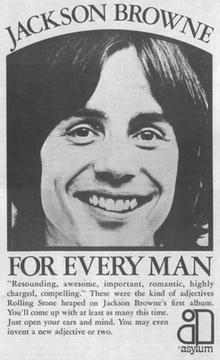
Clyde Jackson Browne is an American rock musician, singer, songwriter, and political activist who has sold over 18 million albums in the United States.
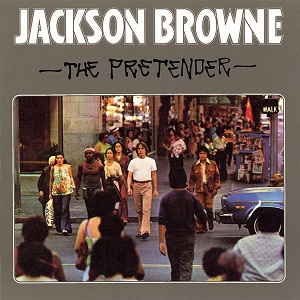
The Pretender is the fourth album by the American singer-songwriter Jackson Browne, released in 1976. It peaked at No. 5 on Billboard's album chart. The singles from the album were "Here Come Those Tears Again", which reached No. 23, and "The Pretender", which peaked at No. 58.
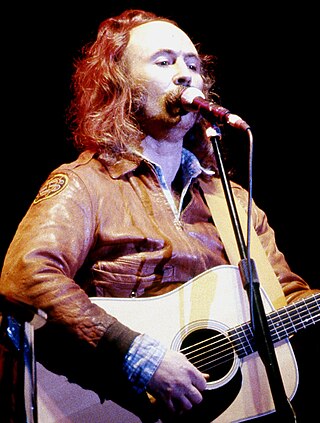
David Van Cortlandt Crosby was an American singer, songwriter, and guitarist. He first found fame as a member of the Byrds, with whom he helped pioneer the genres of folk rock and psychedelia in the mid-1960s, and later as part of the supergroup Crosby, Stills & Nash, who helped popularize the California sound of the 1970s. In addition to his music, Crosby was known for his outspoken personality, politics, and personal troubles; he was sometimes depicted as emblematic of the counterculture of the 1960s.

The Best of James Taylor is the fourth compilation album by American singer-songwriter James Taylor released by Warner Bros. Records in 2003. The same album was released in Europe as You've Got a Friend: The Best of James Taylor.

Jackson Browne is the debut album of American singer Jackson Browne, released in 1972. It peaked on the Billboard 200 chart at number 53. Two singles were released with "Doctor, My Eyes", which peaked at number 8 on the Pop Singles chart, and "Rock Me on the Water", which reached number 48.

For Everyman is the second album by American singer-songwriter Jackson Browne, released in 1973. The album peaked at number 43 on the Billboard 200 chart and the single "Redneck Friend" reached number 85 on the Billboard Hot 100 chart. In 2012, the album was ranked number 450 on Rolling Stone magazine's list of The 500 Greatest Albums of All Time.
Daniel "Danny Kootch" Kortchmar is an American guitarist, session musician, producer and songwriter. Kortchmar's work with singer-songwriters such as Linda Ronstadt, James Taylor, David Crosby, Carole King, David Cassidy, Graham Nash, Neil Young, Steve Perry, and Carly Simon helped define the signature sound of the singer-songwriter era of the 1970s. Jackson Browne and Don Henley have recorded many songs written or co-written by Kortchmar, and Kortchmar was Henley's songwriting and producing partner in the 1980s.

Crosby, Stills & Nash is the debut studio album by the folk rock supergroup Crosby, Stills & Nash (CSN), released in 1969 by Atlantic Records. It is the only release by the band prior to adding Neil Young to their lineup. The album spawned two Top 40 singles, "Marrakesh Express" and "Suite: Judy Blue Eyes", which peaked respectively at No. 28 during the week of August 23, 1969, and at No. 21 during the week of December 6, 1969, on the US Billboard Hot 100. The album itself peaked at No. 6 on the US Billboard Top Pop Albums chart. It has been certified four times platinum by the RIAA for sales of 4,000,000.

Oh Yes I Can is the second solo studio album by Crosby, Stills, Nash & Young member David Crosby. It was released on January 23, 1989, 18 years on from his previous solo release, If I Could Only Remember My Name.
"Wooden Ships" is a song written and composed by David Crosby, Paul Kantner, and Stephen Stills, of which versions were eventually recorded both by Crosby, Stills & Nash and by Kantner with Jefferson Airplane. It was written and composed in 1968 in Fort Lauderdale, Florida, on a boat named Mayan, owned by Crosby, who composed the music, while Kantner and Stills wrote most of the lyrics.
Russell Kunkel is an American drummer who has worked as a session musician with many popular artists, including Bill Withers,Jackson Browne, Joni Mitchell, Jimmy Buffett, Harry Chapin, Rita Coolidge, Neil Diamond, Bob Dylan, Cass Elliot, Dan Fogelberg, Glenn Frey, Art Garfunkel, Nitty Gritty Dirt Band, Carole King, Lyle Lovett, Reba McEntire, Stevie Nicks, Linda Ronstadt, Bob Seger, Carly Simon, Stephen Stills, James Taylor, Joe Walsh, Steve Winwood, Neil Young, and Warren Zevon. He was the studio and touring drummer for Crosby & Nash in the 1970s, and has played on all four of their studio albums.

Crosby & Nash were a musical duo that maintained a separate career in addition to the solo endeavors of David Crosby and Graham Nash, and separate from the larger aggregate of Crosby, Stills, Nash & Young. Crosby and Nash performed and recorded regularly during the 1970s, issuing five albums including three of original studio material. After the more or less permanent reformation of Crosby, Stills & Nash in 1976, the duo continued to play sporadic concerts from the 1980s through the second decade of the 21st century, issuing another studio album in 2004 and going on an extended concert tour in 2011.
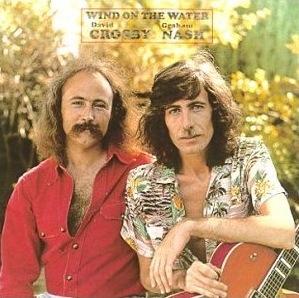
Wind on the Water is the second album by Crosby & Nash, released on ABC Records in 1975. Cassette and 8-track tape versions of the album were distributed by Atlantic Records, to which Crosby, Stills, Nash & Young were signed. It peaked at No. 6 on the Billboard 200 album chart and was certified gold by the RIAA. Three singles were released from the album, "Carry Me", "Take the Money and Run", and "Love Work Out", of which only the first charted, peaking at No. 52 on the Billboard Hot 100 singles chart.
The Section was a US instrumental rock/jazz fusion band formed in the early 1970s by guitarist Danny Kortchmar, keyboardist Craig Doerge, bassist Leland Sklar, and drummer Russ Kunkel. Other musicians associated with the group include multi-instrumentalist David Lindley and guitarist Waddy Wachtel. They are best known for both studio and stage work in support of some of the best selling singer-songwriters and solo singers of that decade. Their frequent appearances on the records of artists signed to Asylum Records made them the label's de facto house band. Their close association with the singer-songwriter and soft rock genres of the 1970s also led to their alternate moniker of "The Mellow Mafia".
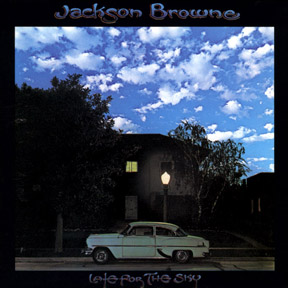
Late for the Sky is the third studio album by American singer–songwriter Jackson Browne, released by Asylum Records on September 13, 1974. It peaked at number 14 on Billboard's Pop Albums chart.
"These Days" is a song written by Jackson Browne and recorded by numerous artists. Browne wrote the song at age 16; its lyrics deal with loss and regret. It was first recorded by Nico in 1967 for her album Chelsea Girl, and Nico's arrangement was recorded by several other artists. Tom Rush recorded the tune with a string arrangement for his album Tom Rush in 1970. Gregg Allman recorded a new arrangement of the song for his 1973 LP Laid Back, and Browne released his own version, based on Allman's arrangement, on For Everyman, also in 1973. "These Days" has since been recorded by many other artists, and remains one of Browne's most enduring compositions.

"The Load-Out" is a song co-written and performed live by Jackson Browne from his 1977 album Running on Empty. It is a tribute to his roadies and fans. The song was recorded live at Merriweather Post Pavilion in Columbia, Maryland, on August 27, 1977, as part of the tour in support of the album The Pretender.
"Guinnevere" is a song written by David Crosby in 1968. The song appears on Crosby, Stills & Nash's critically acclaimed eponymous debut album. The song is notable for its serene yet pointed melody and its unique lyrics, which compare Queen Guinevere to the object of the singer's affection, referred to as "m'lady".
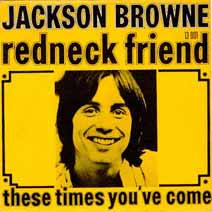
"Redneck Friend" is a song written and performed by American singer-songwriter Jackson Browne, released as the first single from his 1973 album For Everyman, and notable for its double entendre lyrics and guest appearances by Glenn Frey and Elton John, as well as the first appearance of David Lindley on a Jackson Browne single. The song reached number 85 on Billboard's October 20, 1973, Hot 100 chart, spending 10 weeks on that chart after debuting at number 99 on September 29, 1973. It was also released as a single in France and Japan, and as a promotional single in the United Kingdom and Germany.

CSNY 1974 is a live album by Crosby, Stills, & Nash, and their seventh in the CSNY quartet configuration. Issued on Rhino Records in 2014, it consists of concert material recorded in 1974 on the band's tour during the summer of that year. It was issued in several formats: a standard compact disc box set consisting of three audio discs and a standard DVD; as one pure audio Blu-ray disc and a Blu-ray DVD; and a more expensively packaged limited deluxe edition consisting of the material on six vinyl records along with the Blu-ray discs and a coffee table book. Three single disc samplers were also issued: one of the acoustic material exclusively available at Starbucks in the United States and Canada; a second at normal retail outlets; and a third included as a covermount disc to the 250th anniversary issue of the UK music magazine Mojo issued as "an exclusive audio-visual sampler of the new CSNY 1974 box set." Each of the non-sampler sets also contained a 188-page booklet, and all formats were released the same day, with the Mojo sampler arriving with the September 2014 publication of that edition. The three-disc and DVD package peaked at No. 17 on the Billboard 200, while the Starbucks sampler peaked at No. 37 and the selections sampler at No. 81.
